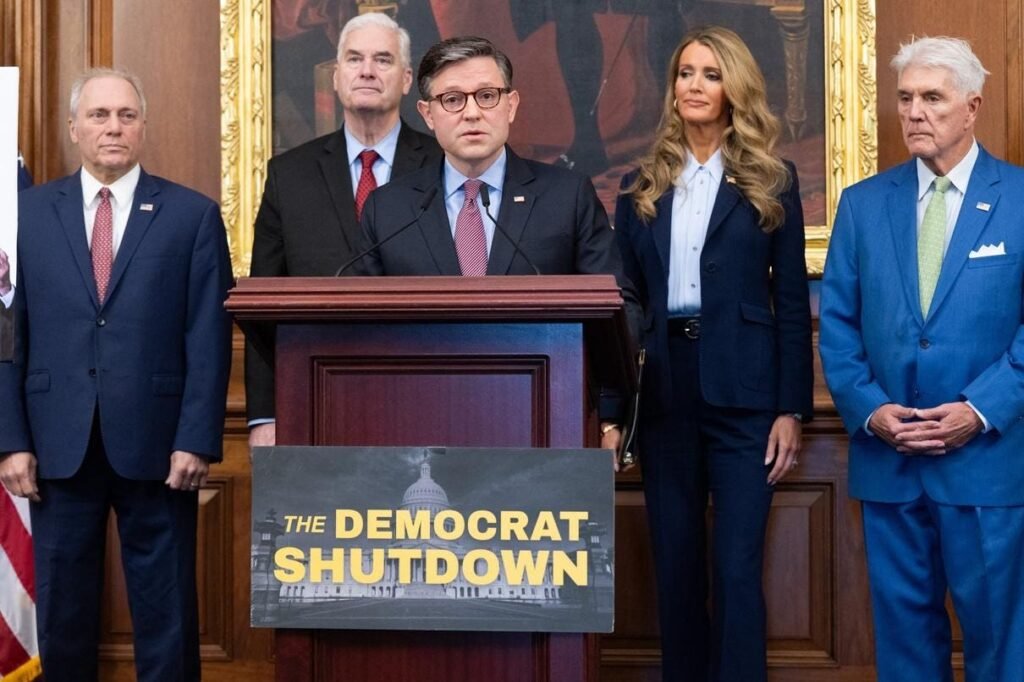“Democrats insist the shutdown is about protecting health care. It’s really about protecting a subsidy gambit that has enriched their political patrons in the insurance industry,” writes Pipes.
AFP via Getty Images
The federal government shutdown is entering its fifth week. At its core, the fight is over insurance subsidies. Democrats are demanding that billions in federal payments to insurers continue uninterrupted. Republicans question whether that’s a good idea.
Democrats claim they’re protecting “access to care.” In reality, they’re enriching some of the country’s largest corporations at the expense of taxpayers.
The enhanced subsidies for exchange coverage are the clearest example. In 2021, as part of the American Rescue Plan Act, Democrats boosted the generosity of the premium subsidies established by Obamacare for everyone making less than four times the poverty level, which is nearly $129,000 for a family of four.
People making less than 150% of poverty—$48,225 for a family of four—became eligible for premium-free coverage. Those making more than four times poverty became eligible for subsidized coverage for the first time.
Democrats extended those subsidies through the end of this year as part of the Inflation Reduction Act of 2022. Making them permanent, as the Democrats want to do, would cost $350 billion over the next decade. That would represent a direct transfer from the federal Treasury to the bank accounts of big insurers.
Much of that figure is waste. Insurers are claiming premium subsidies for millions of people who do not use their coverage at all. Last year, nearly 12 million enrollees—35% of the exchange population—had no claims.
Perhaps they were incredibly lucky. It’s more likely they didn’t know they had exchange coverage. Millions of people have been enrolled in exchange plans without their knowledge or consent, according to research from the Paragon Health Institute. Insurers and brokers have been happy to collect premium subsidies and commissions for these phantom, no-cost enrollees.
Paragon further estimates that more than 6 million exchange enrollees claimed but did not have income between 100% and 150% of the federal poverty level. In more than half of states, the number of people who signed up and reported income between 100% and 150% of poverty is greater than the number of potential enrollees.
Chris Pope of the Manhattan Institute has reported that more than 780,000 exchange enrollees in Miami-Dade County declared income of less than 150% of poverty. But only about 670,000 people in Miami-Dade County have incomes that low. That’s a strong indication that fraud is in play.
The federal government spent $27 billion improperly subsidizing coverage for these folks. That’s billions of dollars in ill-gotten taxpayer funding showing up on the balance sheets of big insurers.
Insurers have found other ways to help themselves to federal dollars outside Obamacare, too. Consider how they’ve been abusing Medicare Advantage, the component of the entitlement that allows beneficiaries to purchase federally subsidized private coverage.
One way they do so is through a strategy known as “upcoding,” wherein an insurer goes out of its way to ascribe multiple medical diagnoses to a particular patient. Medicare Advantage pays insurers more for covering higher-risk patients. So making a person look less healthy than they actually are can lead to higher revenues.
Medicare Advantage plans also try to pick up healthier seniors—and foist seniors who are likely to need lots of expensive care off onto other plans or onto traditional Medicare. Offering supplemental benefits that have little to do with health—like new golf clubs for beneficiaries or complimentary ski passes—can attract well-off seniors less likely to have high health costs.
These strategies have proven lucrative for insurers—and costly for taxpayers. The Committee for a Responsible Federal Budget says that these two tactics will lead to $1.2 trillion in overpayment to Medicare Advantage plans over the next ten years.
When the government is the dominant payer, companies adapt to the incentives it lays out. Insurers have done so masterfully. They have turned programs meant to promote choice and affordability into dependable, multibillion-dollar taxpayer-funded revenue streams.
Democrats insist the shutdown is about protecting health care. It’s really about protecting a subsidy gambit that has enriched their political patrons in the insurance industry. Republicans should recognize that reality and hold firm.


